You found our list of top decision making books.
Decision making books are guides that help readers make smarter choices more quickly. These references cover subjects like decision paralysis, bias, and risk-taking. The purpose of these works is to improve decision making skills and help professionals feel more confident in their choices.
These books are a subset of leadership books and management books and are similar to problem solving books, conflict resolution books, and books on business strategy.
This article includes:
- managerial decision making books
- business decision making books
- strategic decision making books
- books on decision making psychology
Here we go!
List of decision making books
Here is a list of books to improve decision making skills in the workplace and in life.
1. Decisive: How to Make Better Choices in Life and Work by Chip Heath
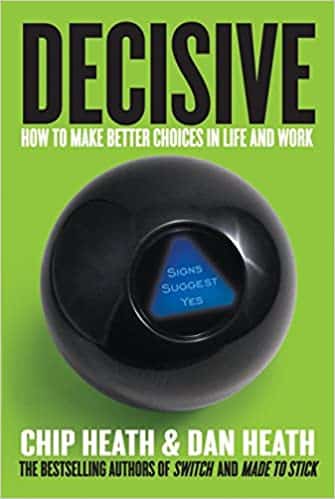
Decisive provides a practical toolkit for making worthwhile choices. The book identifies prejudices and incorrect beliefs that often prevent good judgment, and lays down a framework for overcoming these influences and making better choices. The pages are full of simple strategies and tips for narrowing down choices, challenging impulses, considering different perspectives, and achieving the desired results. The book draws on anecdotes and academic research to back up the theories and is equal parts informative and entertaining. Decisive gives advice on a wide range of topics, from group-decision making to ending the endless cycling of “what-if” thinking.
Notable Quote: “Success emerges from the quality of the decisions we make and the quantity of luck we receive. We can’t control luck. But we can control the way we make choices.”
Read Decisive.
2. Thinking in Bets: Making Smarter Decisions When You Don’t Have All the Facts by Annie Duke
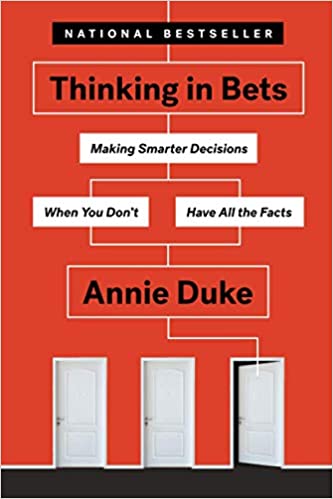
Thinking in Bets is one of the most helpful managerial decision making books. Often in business, leaders have to make tough calls with incomplete information. Operating on the philosophy that “even the best decision doesn’t yield the best outcome every time,” this book teaches readers how to take calculated risks by performing quick calculations and taking short personal inventories. Former World Series of Poker champion Annie Duke shows readers how to gamble smartly by weighing the odds before calling the shots. The pages present several case studies that show the thinking processes of successful risk takers along with strategies for making bets that pay off. Thinking in Bets lays down a mindset for filling in information gaps and making bold calls with confidence.
Notable Quote: “What makes a decision great is not that it has a great outcome. A great decision is the result of a good process, and that process must include an attempt to accurately represent our own state of knowledge. That state of knowledge, in turn, is some variation of “I’m not sure.”
Read Thinking in Bets.
3. Thinking, Fast and Slow by Daniel Kahneman

Thinking, Fast and Slow is one of the best decision making books of all time. In this work, psychologist and Nobel Prize winner Daniel Kahneman explores the two main systems of thinking that guide human judgement: the quick emotional response and the slower, more logical process. Kahneman outlines the nuances and appropriate uses for each system and shows how these ways of thinking influence outcomes. The book offers tools for overcoming bias, regulating emotions, making accurate projections, and allotting the proper amount of time to the decision-making process. Thinking, Fast and Slow is an in-depth exploration into the human mind that reveals how and why we make choices, and gives advice how to make decisions that better serve us.
Notable Quote: “Intelligence is not only the ability to reason; it is also the ability to find relevant material in memory and to deploy attention when needed.”
Read Thinking, Fast and Slow.
4. The Paradox of Choice: Why More Is Less by Barry Schwartz
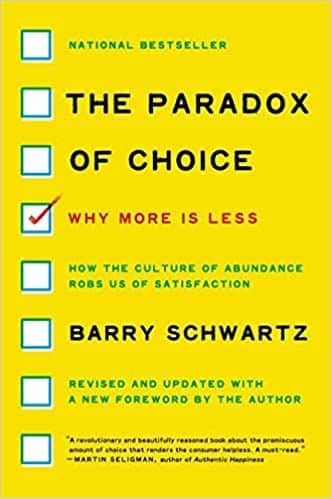
The Paradox of Choice explores the effects of having plentiful options. The book explains that while some choices can lead to better quality of life, having too many choices decreases happiness, increases anxiety, and often leads to decision-making fatigue and decision paralysis. Barry Schwartz aims to find the tipping point that defines “too many choices,” and outlines strategies for readers to limit choices, focus on priorities, banish doubt and the fear of missing out, and be more confident in decisions. The Paradox of Choice preaches the notion that decision making is not always about seeking better, and knowing when to settle and be satisfied is an important part of the process.
Notable Quote: “Unfortunately, the proliferation of choice in our lives robs us of the opportunity to decide for ourselves just how important any given decision is.”
Read The Paradox of Choice.
5. Nudge: Improving Decisions About Health, Wealth, and Happiness by Richard H. Thaler and Cass R. Sunstein

Nudge revolves around the influence of outside factors on the decision-making process. The book asserts that no choice exists in a completely neutral context, and preconceived ideas can drive the decision unconsciously. The guide aims to make readers more aware of the “choice architecture” that guides decision making and to help individuals choose options that lead to better personal outcomes. The authors are a Nobel Prize winner and Havard professor respectively, and back up these ideas with research and data. Nudge sheds light on the unconscious side of decision making and helps readers to make more proactive and objective choices.
Notable Quote: “The combination of loss aversion with mindless choosing implies that if an option is designated as the “default,” it will attract a large market share. Default options thus act as powerful nudges.”
Read Nudge.
6. HBR’s 10 Must Reads on Making Smart Decisions by Harvard Business Review
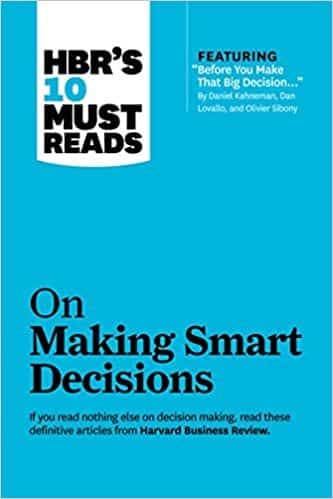
HBR’s 10 Must Reads on Making Smart Decisions is one of the best business decision making books. This anthology draws on past publications from Harvard Business Review to break down the science of making savvy business decisions. Essays include “The Hidden Traps in Decision Making,” “Conquering a Culture of Indecision,” and “Why Good Leaders Make Bad Decisions.” The book covers the full range of the topic and gives advice on making choices and gaining buy-in and backing in a variety of situations. The guide provides an overview of the subject and provides a solid foundation for improving decision making skills in the workplaces, especially as a manager or leader.
Notable Quote: “Bad decisions can often be traced back to the way the decisions were made– the alternatives were not clearly defined, the right information was not collected, the costs and benefits were not accurately weighed. But sometimes the fault lies not in the decision-making process but rather in the mind of the decision maker.”
Read HBR’s 10 Must Reads on Making Smart Decisions.
7. “Yes” or “No”: The Guide to Better Decisions by Spencer Johnson
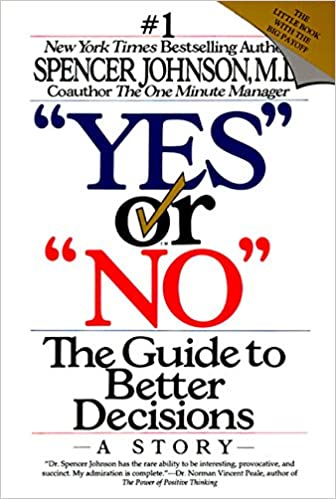
“Yes” or “No” presents a system for decision making. The book helps readers separate emotional arguments from logical arguments and come to conclusions that satisfy both sides. Through the use of simple questions, this framework helps individuals avoid overcomplicating elements and distractions and identify choices that align with belief systems, personal benefits, and priorities. Spencer Johnson’s typical writing style involves dispersing advice while telling a central story, and this book is no different. “Yes” or “No” is a short read that offers decision makers clarity and direction when faced with choices.
Notable Quote: “To make a better decision I first stop proceeding with a poor decision.”
Read “Yes” or “No” and check out more of Johnson’s work on this list of change management books.
8. Noise: A Flaw in Human Judgment by Daniel Kahneman, Olivier Sibony, and Cass R. Sunstein

Noise: A Flaw in Human Judgment explores how the environment can affect judgment. The authors assert that given the same choice, an individual may make completely different calls based on surrounding conditions. The book defines “noise” and differentiates the concept from bias, and makes the case for being more aware of noise’s influence to more standard and predictable decisions. Noise: A Flaw in Human Judgment is a study of subjectivity and a rallying call to improve current decision making systems.
Notable Quote: “To understand error in judgment, we must understand both bias and noise.”
Read Noise: A Flaw in Human Judgment.
9. Algorithms to Live By: The Computer Science of Human Decisions by Brian Christian and Tom Griffiths
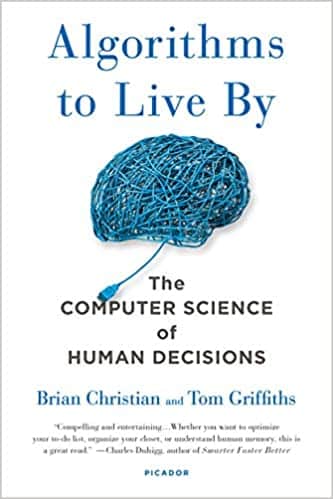
Algorithms to Live By is a book that insists that the same principles that guide computer algorithms can be applied to the human decision making process. In the same way one can program a computer, one can reprogram the mind to be more efficient in making choices. The book addresses topics such as the right time to stop gathering information, sorting and organizing data, prioritizing, and making predictions. This formulaic approach can help readers separate the action from the emotion and see decision making as a set of steps and maneuvers to try. The book advocates for an experimental and scientific approach to decision that prevents overthinking, and points out the lessons that can be learned from machines.
Notable Quote: “To try and fail is at least to learn; to fail to try is to suffer the inestimable loss of what might have been.”
Read Algorithms to Live By.
10. The Art of Thinking Clearly by Rolf Dobelli
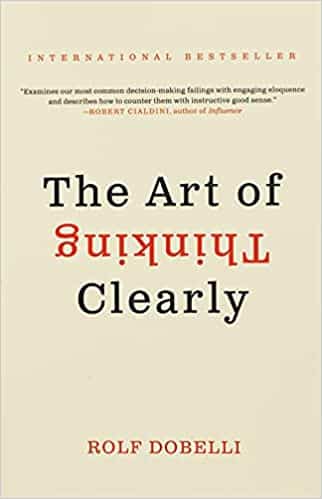
The Art of Thinking Clearly is an exploration of errors in reasoning and ways to avoid faulty logic. The book explores the full range of potential biases so that readers can more easily identify these blindspots. The text also lays out a series of guidelines to combat these biases, such as beware the “special case,” as well as explanations for where these ideas come from, like “why you systematically overestimate your knowledge and abilities.” The book functions as a sort of field guide for misconceptions and fallacies and helps readers make more sound, informed, reality-based decisions. The Art of Thinking Clearly is overcoming off-base instincts and more accurately assessing situations.
Notable Quote: “The human brain seeks patterns and rules. In fact, it takes it one step further: If it finds no familiar patterns, it simply invents some.”
Read The Art of Thinking Clearly.
11. Predictably Irrational: The Hidden Forces That Shape Our Decisions by Dr. Dan Ariely
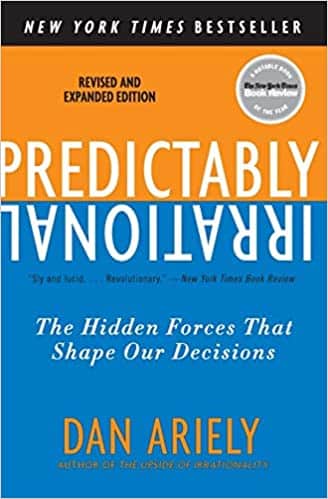
Predictably Irrational is one of the most interesting books on decision making psychology. The bestseller explores the reason behind questionable judgement and shows that these irrational decisions are formulaic and foreseeable. Dan Ariely proves his points through references to MIT behavioral science experiments. The research shows that human beings are not as in control of their actions as they think or claim and that ridiculous decisions are not as random or unexpected as may first appear. By exploring the elements behind these lapses in good judgement, Ariely challenges readers to be more mindful and accountable and make choices that are based more on outcome than emotion. Predictably Irrational gives explanation to seemingly inexplicable choices and provides a deeper understanding into the reality of human decision making psychology.
Notable Quote: “Humans rarely choose things in absolute terms. We don’t have an internal value meter that tells us how much things are worth. Rather, we focus on the relative advantage of one thing over another, and estimate value accordingly.”
Read Predictably Irrational.
12. Superforecasting: The Art and Science of Prediction by Philip E. Tetlock and Dan Gardner
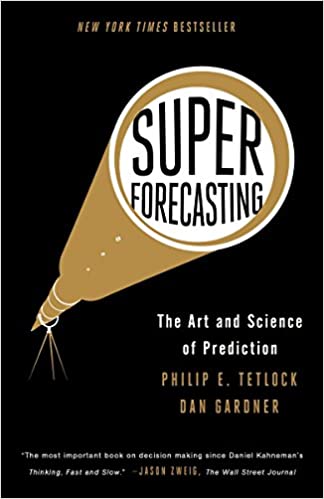
Superforecasting is one of the best strategic decision making books. This work draws heavily on the findings from The Good Judgment project, an experiment that monitored the predictions of thousands of everyday people over the course of many years. Sharing observations and stories from the study as well as case studies from modern history, the authors reveal valuable insights and pinpoint the qualities that help individuals make accurate predictions. The book uses these examples to give advice on foreseeing the future by relying on data from multiple sources, employing teamwork, and being willing to own up to mistakes and change direction.
Notable Quote: “Quit pretending you know things you don’t and start running experiments.”
Read Superforecasting.
Final Thoughts
The modern world offers more choices than perhaps at any other time in human civilization. Yet despite the regularity and abundance of options, many professionals struggle with the decision making process. Individuals and organizations alike are prone to overthinking, being blinded by bias, or second guessing the final solution.
Books on decision making can give professionals the skills and mindsets needed to see dilemmas more clearly, weigh the options, and make the most promising and fitting choices. Decision-making is an essential quality in a fast-paced and ever-changing world, and these guides can help folks feel less overwhelmed when faced with a dilemma and feel more confident in their calls. By nature, humans are prone to irrational beliefs and behavior. These books encourage individuals to challenge those instincts and expectations and make critical decisions in a responsible manner.
Next, check out this list of books on focus and this list of habit-building books.
We also have a list of the best books on communication and list of problem solving books.
